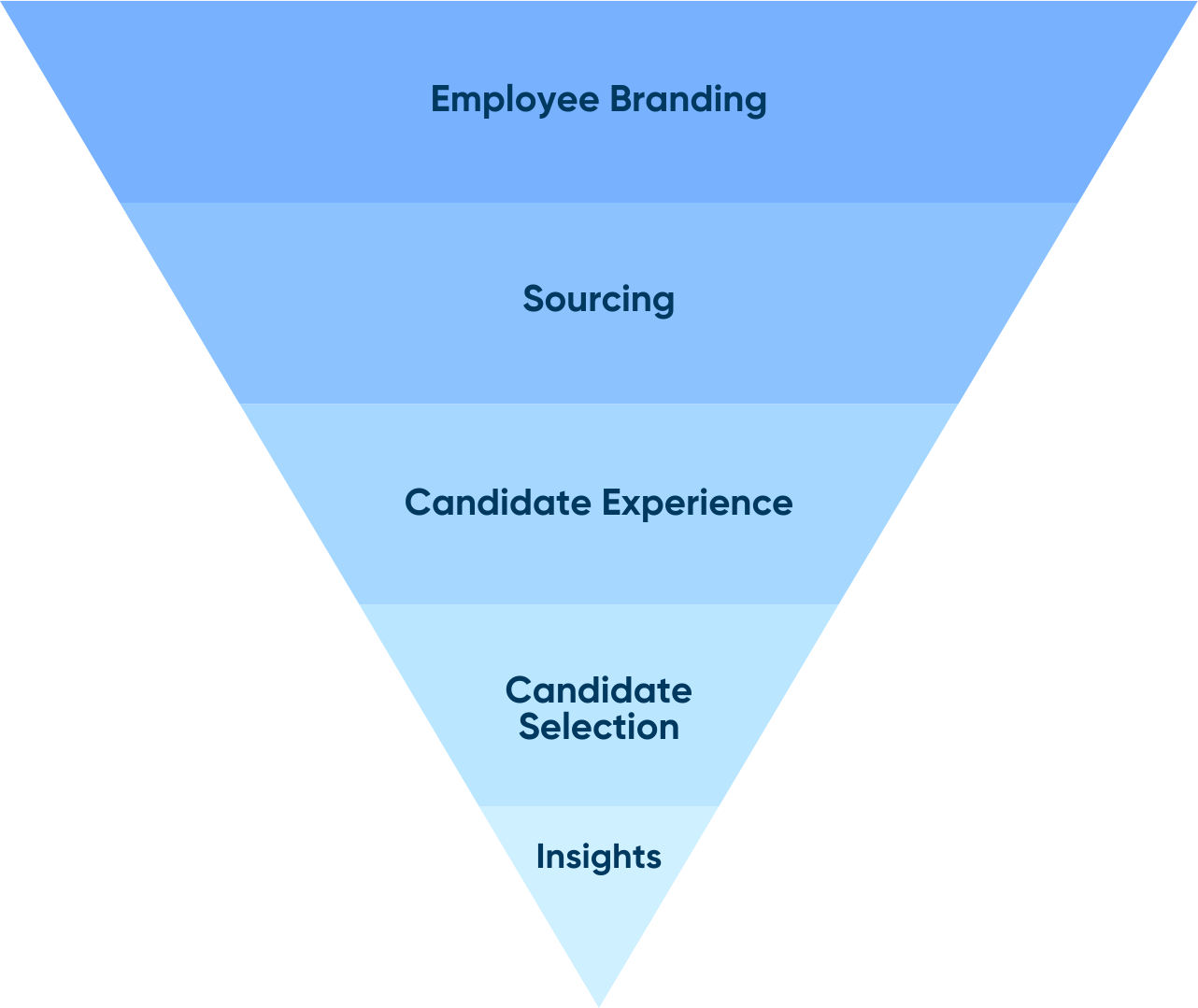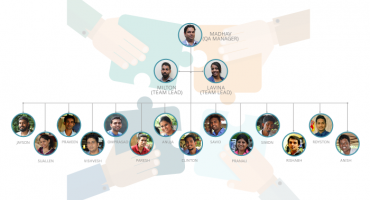The HR Perspective: Obstacles Faced in Recruiting Tech Professionals and How to Overcome Them

What makes a software development company successful?

For starters, you may say, having a good business plan in place so you can make wise investments in projects. Others may say networking with the right crowd and conducting thorough market research to get the best ROI.
Don’t get us wrong. Yes, all of these elements are important but ask yourself, “What makes a company grow and helps you achieve success?”
It’s finding the right team players of course!
Without the right people on board, shaping your company the way you desire is going to be an uphill battle. After all, even if you have exceptional entrepreneurship skills, it’s rare to achieve success alone.
So you see the pressure HR is under to make sure the right talent is under their wing? We bring you the most trending HR challenges in the tech industry today and how to overcome them.
You will learn about
- The most sought-after skills needed in a tech professional
- Striking the balance between soft skills and technical skills
- The quest for finding qualified talent in a limited talent pool
- The most common problems faced during the different stages of recruitment
The most sought-after skills needed in a tech professional?

First off, it’s about dealing with the challenges of technology in human resource management when looking for the right candidates. After all, for tech companies, having individuals that are well versed in the latest technologies is not only admired but expected.
Since employees need to update their skills to perform productively for jobs they apply for, it becomes more tedious for HR to find and develop talent according to the standards of the company.
At SJ Innovation, we emphasize knowing about new-age technologies that are currently trending and so expect our team to be well versed in Magento, PHP, React, iOS, and Drupal among others.
Striking the balance between soft skills and technical skills

Nowadays having software development skills and technical skills isn’t enough. As the software industry begins to blend in with business, developers need to also be fluent in soft skills. This is another challenge that recruiters face especially in software development. Ideally, HR for tech companies needs to see whether the right candidate has these soft skills in their toolbox.
- Communication: Since you are going to be part of a larger team, it’s vital to talk to stakeholders, clients, developers, and QA engineers in a clear, patient, and confident way.
- Empathy: Being able to put yourself in another person’s shoes and understand their problems and mental health does wonders.
- Patience: You need to keep your cool to bear the long and time-consuming processes of software development in its agile environment.
- Other soft skills: Besides the ones mentioned above, adaptability, open-mindedness, problem-solving, humility, critical thinking, creativity, accountability, teamwork, collaboration, management, and confidence are all essentials when recruiting the right people.
The quest for finding qualified talent in a limited talent pool

One of the most widely recognized challenges in IT recruitment is finding the right talent that ticks all the boxes. Before the pandemic hit, in 2019, CompTIA reported that there was a shortage of around 918,000 software engineers in the talent pool.
The aftermath of the COVID-19 pandemic has only disrupted work culture even further. As a result, the demand for software and technology experts has only risen. Even the existing number of candidates with certifications and qualifications in IT and computer science can only meet half of the market demands. Given this scenario, we:
- Look for candidates that come with a willingness to learn: Instead of focusing on good grades, it’s important to look at the applicant’s capabilities and whether they are a perfect fit for your company’s needs. While a basic level of certification is vital, focusing more on internal training and upskill makes more sense. Making sure the potential employee understands the roles and responsibilities that come with the job position counts.
- Allow them to prepare: While some applicants do not have the experience, others do not possess the expertise and skills. Many developers do not have formal credentials, yet they are working as capable developers today. So for freshers or those with limited experience, we offer guidance through research and study material which helps them prepare for the topics. We also offer multiple chances for truly promising candidates.
- Seek out passive applicants: Many individuals are not actively pursuing a job. This is one of the major challenges we face. Some applicants do not revert when they realize what the roles and responsibilities of a job entail. For instance, when applying for QA, candidates believe they do not have to perform coding. It’s only after a discussion, they realize that QA requires a certain amount of coding too.
- Use helpful marketing strategies: Many individuals consider job opportunities based on what appeals to them. This doesn’t necessarily mean a high-paying job. Currently, tech professionals are interested in the culture of the workplace, whether they have the option of working from home and whether they have opportunities for growth and training. For instance, we have introduced a hybrid work structure since working from home becomes convenient for some individuals. In this way, team members can show up at the office a few times a week. If we find good talent, we are also open to remote working. Having a positive brand image and having a desirable workplace helps to attract potential candidates. At SJ Innovation, we regularly foster a team bonding experience through fun team-building activities. This also helps individuals communicate freely and the team feels connected when they interact with each other.
- Help fresh graduates gain industry knowledge: Today, students are not getting enough exposure from colleges owing to the pandemic. So we help them with learning material and relevant experience as well as host hackathons, meetups, and invite outside participants. We also help students through our community outreach program, an approach not many companies follow, so that candidates gain the exposure they need. Ultimately, it’s a two-way street so only if candidates wish to be a part of the company, we can offer the resources they need to prosper.
The most common problems faced during the different stages of recruitment
There are other challenges in HR too:

- Tight timeframes: If the recruitment process is too long, candidates tend to get impatient. So, we try to keep the time from a job opening to hire as short as possible. Having said that, there’s no denying that delays occur. When we have a vacancy, we cannot simply hire the first individual that applies. The candidate needs to be promising as well as fit to handle the roles and responsibilities that ensue. So finding the ideal one for the role can take around 2-3 weeks. Also, HR focuses on various other responsibilities so the time that goes into recruitment also gets delayed. At SJ Innovation, we have an HR round, a tech round, a practical round (where we test the coding abilities of the candidate), and lastly, the final interview round. At times, we also encounter situations when a candidate who applies for a specific position may be actually suitable for another position altogether and may not be really aware of their potential. In this scenario, we sometimes explain how they are best suited for the other role and switch their profile accordingly.
- Never showing up after the initial contact: Some candidates accept the offer and do not revert. Lack of communication is the underlying issue. During this case, keeping in touch with the candidates and following up with them gives us an idea of whether they will be onboard.
- The tech career isn’t their true calling: There are other problems with HR and technology too from the recruitment point of view. Some applicants join the software industry for no particular reason. Since IT is a trending field, they tend to pursue it. Then, there are instances where people join due to personal or financial difficulties. Others apply for multiple positions in the hopes that they secure any job available. Candidates need to understand why they wish to take up a job title and then skim through the job description. The onus is also on the company to make sure the qualifications fit an individual who fits the role. The potential candidates should also have the soft skills needed to make a success out of the role they apply for.
So there you have it. The most prominent human resources problems and solutions. No doubt, the job market is a challenging one. Currently, it's as important for companies to win over talented tech professionals as much as potential candidates must find their dream jobs.
It takes a lot of patience, time, skill, and money to find the right developer/manager. However, the rewards can be just as sweet when all the hard work and toil make it easy to find the right people on board who can take your company forward to the next level!
Once we find the right software professionals and the recruiting process is complete, we begin onboarding the members. Want to know how we do this? Read the SJ Innovation Guide to Onboarding Developers: Part 1.

Developing Leadership Skills and Taking Accountability: How-To Guide

T (Together) E (Everyone) A (Achieves) M (More)


